If you’re looking for the 15 best PoE voltage testers, I recommend options that support various standards like PoE+, 4PPoE, and passive PoE, with features such as cable testing, fault detection, and power measurements up to 100W. Devices like TRENDnet TC-NTP1 or VXSCAN kits offer reliable diagnostics for network faults, wiring issues, and power issues. To find the right tool for your needs, I’ll guide you through my top picks and key factors to contemplate.
Key Takeaways
- Supports multiple PoE standards (802.3af/at/bt, UPOE, PoH) for comprehensive network power testing.
- Measures voltage, current, wattage, and detects wiring faults with high accuracy.
- Portable, user-friendly designs with LCD or OLED displays for quick diagnostics.
- Compatible with various Ethernet cables (CAT5e, CAT6, CAT6a) and non-PoE sources.
- Features built-in LED lamps, multiple power options, and rugged construction for field reliability.
PoE-T100 Inline DC & PoE Tester Tool

The PoE-T100 Inline DC & PoE Tester Tool is the ideal choice for network professionals who need quick, accurate power diagnostics directly at the device level. It’s self-powered, drawing power from PoE standards or DC sources, so no batteries are needed. Supporting multiple PoE types and non-PoE power sources, it provides versatile testing. With three modes—PD, Inline, and DC—it measures voltage, current, power, and polarity in real time. Its bright OLED display shows clear data, making diagnostics straightforward. This tool speeds up troubleshooting, guarantees proper installation, and helps maintain network reliability without any guesswork.
Best For: network installers, engineers, and IT professionals seeking quick, reliable power diagnostics directly at network devices.
Pros:
- Supports multiple PoE standards and non-PoE DC power sources, offering broad compatibility.
- Self-powered with an OLED display for easy, real-time measurements and diagnostics.
- Facilitates faster troubleshooting and accurate power assessment, reducing network downtime.
Cons:
- May require familiarity with PoE standards to interpret advanced data effectively.
- Limited to testing power and polarity; does not perform comprehensive network diagnostics.
- Slightly bulkier design could be less convenient for use in tight spaces.
RJ45 Network Cable Tester, VXSCAN Ethernet Cable Continuity Tester Kit

If you’re looking for a reliable tool to troubleshoot and verify network cables quickly, the VXSCAN Ethernet Cable Continuity Tester Kit is an excellent choice. It combines PoE testing, continuity checks, cable tracing, and LED lighting in one portable device, supporting CAT5e, CAT6, and CAT6a cables. With an RJ45 remote interface, it requires no extra setup, making on-the-go troubleshooting straightforward. It automatically detects PoE standards, voltage, polarity, and mode, and tests for wiring faults, shorts, and circuit interruptions. The built-in LED lamp improves visibility in dark environments, and its user-friendly design makes it suitable for both professionals and home users.
Best For: network technicians and home users seeking an affordable, portable tool for quick cable verification, PoE testing, and troubleshooting.
Pros:
- Combines multiple testing functions including continuity, PoE, and cable tracing in one device
- Portable design with a carry bag and built-in LED lamp for convenient use on the go
- Supports common cable types (CAT5e, CAT6, CAT6a) and features automatic PoE detection for easy operation
Cons:
- Digital and analog wire detection may be overly sensitive, leading to potential false signals
- Slight inaccuracies reported in cable length measurement
- Clarification needed on error indicators like “R” and “M” for troubleshooting
Network RJ45 Tester, VXSCAN POE Ethernet Tester
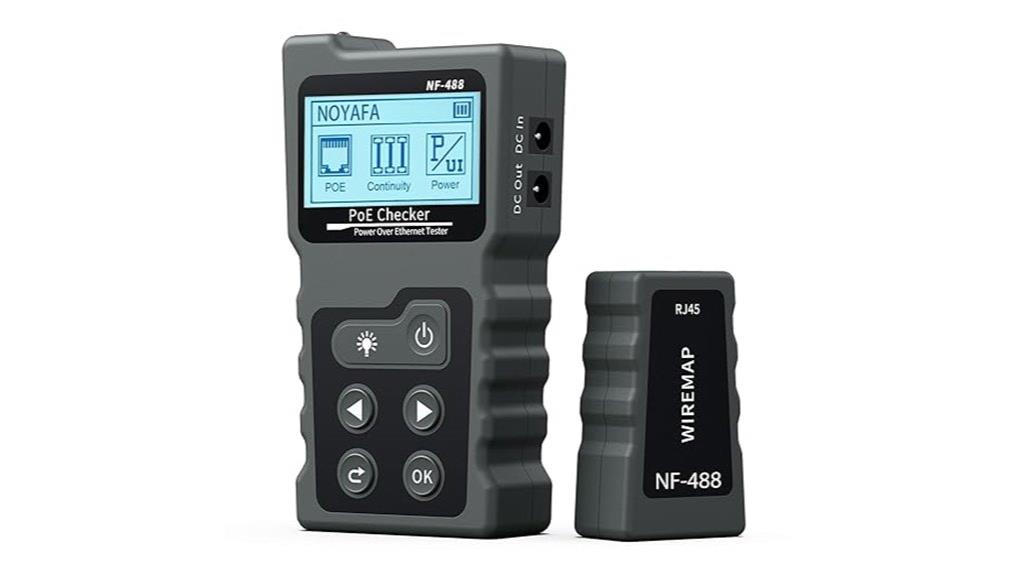
For network technicians seeking a reliable tool to diagnose both cable and Power over Ethernet issues, the Network RJ45 Tester and VXSCAN POE Ethernet Tester stand out. These devices quickly identify cable problems like shorts, open circuits, and crossovers, compatible with CAT5 and CAT6 cables. They also analyze POE standards, voltage, polarity, and modes, including non-standard devices. With loop-back testing and power measurements up to 60V, 3A, and 180W, they cover a wide range of diagnostics. The LCD screen with backlight and ergonomic design make it easy to use in various environments, ensuring accurate data at a glance.
Best For: network technicians and IT professionals who need a comprehensive tool to diagnose cable issues and Power over Ethernet (PoE) problems quickly and accurately.
Pros:
- Combines cable testing, PoE analysis, and power measurements in one device for versatile diagnostics
- Compatible with both CAT5 and CAT6 cables, ensuring broad applicability
- Features an LCD with adjustable backlight for clear visibility in various environments
Cons:
- May require some training to fully utilize all advanced testing features
- Limited to testing up to 60V and 3A, which might not cover extremely high-power applications
- Ergonomic design, while comfortable, could be less durable under heavy field conditions
TRENDnet Inline PoE Tester, TC-NTP1
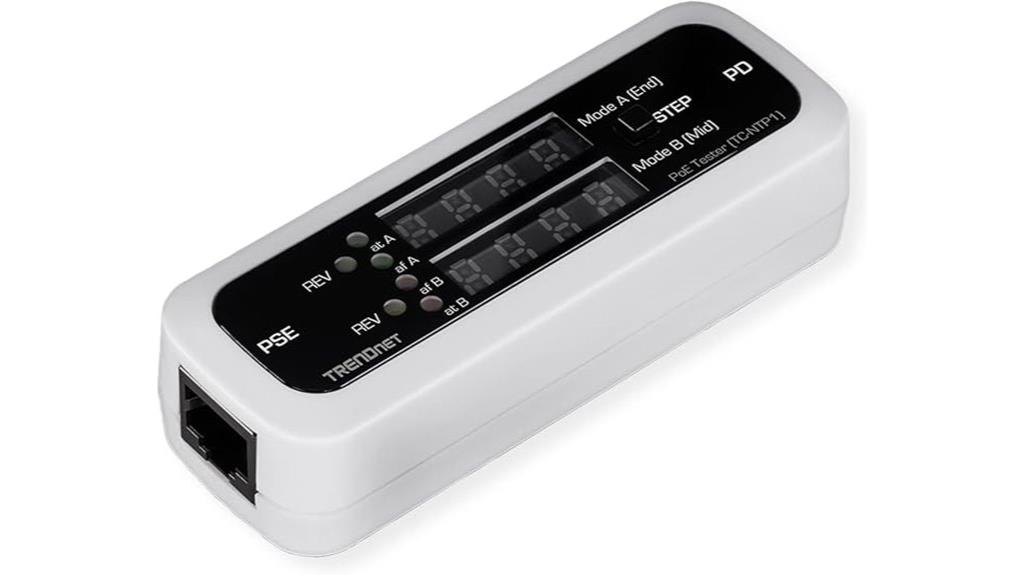
When troubleshooting or installing PoE networks, the TRENDnet TC-NTP1 Inline PoE Tester stands out as an ideal tool for network professionals who need quick, accurate readings of voltage, wattage, and polarity. It supports various PoE standards, including 4PPoE, PoE+, and PoE, up to 100W, and works with passive PoE devices from 11V to 60V. With its plug-and-play design, it features two Gigabit ports for seamless PSE and device connections. The tester offers three modes—T, N, and I—displaying wattage, voltage, amperage, and polarity via LED indicators. It’s NDAA compliant, reliable, and backed by a two-year warranty, making troubleshooting straightforward.
Best For: network professionals and technicians seeking a reliable, easy-to-use tool for testing and troubleshooting PoE connections across various standards.
Pros:
- Supports multiple PoE standards up to 100W, including passive PoE from 11V to 60V
- Provides comprehensive readings of wattage, voltage, amperage, and polarity via LED display
- Plug-and-play design with two Gigabit ports for seamless testing without additional setup
Cons:
- Limited to testing PoE and passive PoE; does not support non-PoE network functions
- May require familiarity with PoE standards for optimal use of different modes
- No additional features such as remote monitoring or data logging
Mcbazel Network Cable Tester for Ethernet and POE Lines

The McBazel Network Cable Tester stands out as an ideal tool for IT professionals and electricians who need a reliable, all-in-one device for diagnosing Ethernet and POE lines. It supports CAT5e, CAT6, and CAT6a cables, offering POE detection, continuity testing, and power analysis. I appreciate its ability to measure POE voltage polarity, monitor power consumption, and detect loopback or wiring issues quickly. Its LCD display provides clear diagnostics, and the device’s portability makes it perfect for on-the-go troubleshooting. Overall, it combines professional-grade features with user-friendly operation, making it a valuable addition to any network technician’s toolkit.
Best For: IT professionals and electricians seeking a reliable, all-in-one tool for diagnosing and testing Ethernet and POE lines in various environments.
Pros:
- Supports multiple cable types (CAT5e, CAT6, CAT6a) with comprehensive diagnostics
- Portable design with built-in LED light and customizable backlight for ease of use in various settings
- Accurate POE detection and power measurement validated against professional-grade tools
Cons:
- Rigid plastic case may be prone to damage if dropped, suggesting a protective rubber shield could be beneficial
- Slightly higher price point (~£30) may be a consideration for casual users
- Limited advanced features beyond basic diagnostics, which might not satisfy highly specialized network analysis needs
PoE Detector for Ethernet Power Testing
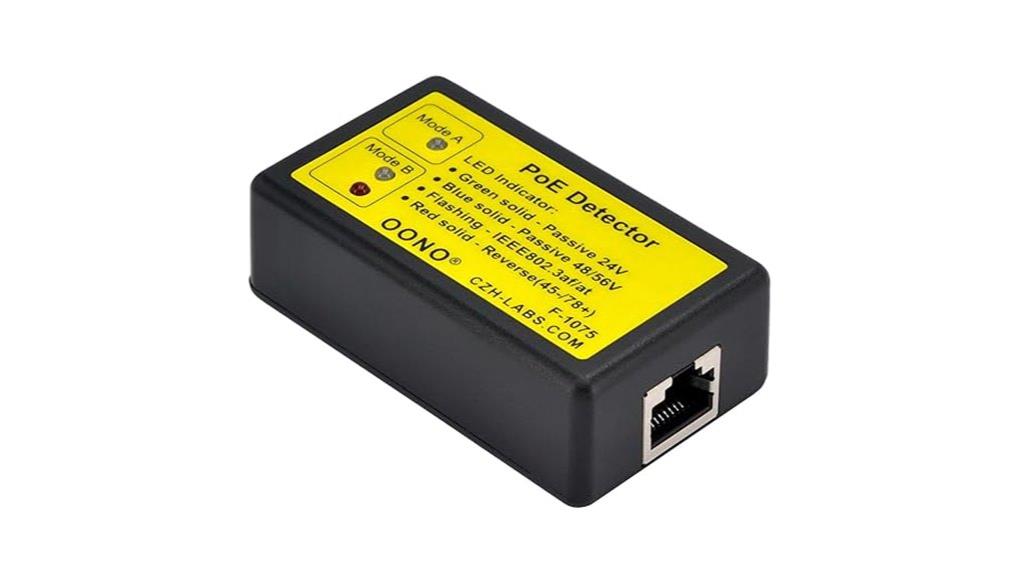
If you’re installing or troubleshooting network devices that rely on Power over Ethernet, the PoE Detector OONO F-1075 is an essential tool for quickly verifying the presence and type of PoE voltage. It connects directly to the RJ45 port and displays voltage type through LED indicators, identifying IEEE 802.3af, 802.3at, passive 24V, 48V, 56V, and reverse polarity Mode B. Powered solely by the Ethernet cable, it’s simple to use, with no batteries or complex setup required. This compact device helps ensure safe, compatible connections for cameras, IP phones, and access points, preventing damage and saving troubleshooting time.
Best For: network administrators, installers, and DIY enthusiasts needing quick, reliable PoE verification to ensure device safety and proper setup.
Pros:
- Easy to use with no batteries or complex setup required
- Compact, lightweight design for portability and convenience
- Clearly indicates PoE type and voltage through intuitive LED signals
Cons:
- Does not support Starlink PoE due to proprietary implementation
- Limited to detecting PoE presence and type, not line quality or connectivity
- No included documentation or detailed voltage level information
NOYAFA NF-488 POE Cable Tester for Ethernet Networks

The NOYAFA NF-488 POE Cable Tester stands out as an ideal choice for network professionals and tech enthusiasts who need a reliable, all-in-one tool for troubleshooting Ethernet networks. It detects POE, tests cable continuity, and verifies connections quickly, saving time during installations. The device automatically identifies standard and non-standard POE voltages, polarity, and jumper configurations, with a testing range up to 60V. Its large backlit LCD provides clear results, and the multiple RJ45 ports and accessories support various testing scenarios. Compact and user-friendly, the NF-488 is perfect for diagnosing wiring faults, measuring cable length, and confirming POE operation in different network environments.
Best For: network professionals, contractors, and DIY enthusiasts seeking a versatile, reliable tool for troubleshooting Ethernet networks and verifying POE and cable integrity.
Pros:
- Multifunctional device that combines POE detection, cable testing, and port verification in one unit
- Large backlit LCD screen provides clear, easy-to-read results in various lighting conditions
- Supports testing of shielded wires, gigabit speeds, and offers manual digital or analog testing modes
Cons:
- Build quality primarily plastic with some fragile-feeling buttons may affect durability
- Battery consumption can be high, requiring frequent recharging or battery replacements
- Some chargers (e.g., smart chargers) may be incompatible with USB-C power supply used for recharging
NOYAFA Network Cable Tester with Multimeter Tester

For technicians and DIY enthusiasts who need a versatile tool, the NOYAFA Network Cable Tester with Multimeter Tester stands out because it combines network testing, cable tracing, and electrical measurements in one portable device. It supports Ethernet cable testing (RJ45, CAT5, CAT6), cable length measurement, fault location via TDR, port flashing, and identification. It also detects electromagnetic interference, non-contact voltage, and tests PoE voltage, polarity, and mode. The device features a rechargeable USB-C battery and a separate 9V probe battery for convenience. Its integrated multimeter measures voltage, current, resistance, and temperature, making it a reliable all-in-one tool for network troubleshooting.
Best For: DIY enthusiasts and professional technicians seeking a multifunctional, portable tool for network testing, electrical measurements, and cable troubleshooting.
Pros:
- Combines network testing, cable tracing, and multimeter functions in a single device for versatile use.
- Supports various Ethernet cables (RJ45, CAT5, CAT6), with features like cable length measurement, fault detection, and PoE testing.
- Rechargeable USB-C battery and separate 9V probe battery enhance convenience and safety during use.
Cons:
- Cable length measurement is limited to meters, with no option for feet, which may be inconvenient for some users.
- Dual RJ45 ports can cause confusion and may complicate port switching during testing.
- Manual lacks detailed instructions, potentially challenging beginners in understanding all features and proper operation.
PoE Detector & Tester Kit (Gen2.5) for Network Cable Power Detection

Technicians who need a reliable and easy-to-use tool for detecting and measuring PoE on Ethernet cables will find the PoE Detector & Tester Kit (Gen2.5) ideal. This compact kit quickly identifies power presence, PoE types, and measures voltage, current, and power consumption on Cat5 and Cat6 cables. Its bright LEDs display IEEE 802.3af, 802.3at, and passive modes, while measuring from 3.5V to 56V. Designed to fit comfortably in hand, it’s powered directly from the network line, with no batteries needed. This self-sufficient device helps troubleshoot efficiently and guarantees safe, accurate installation of network devices.
Best For: network technicians and installers seeking a reliable, portable tool for detecting, measuring, and troubleshooting PoE on Ethernet cables to ensure safe and efficient device installation.
Pros:
- Easy-to-read LED indicators quickly identify PoE presence and type, streamlining troubleshooting.
- Compact, ergonomic design allows comfortable handling in tight spaces or on ladders.
- Self-powered from the network line, eliminating the need for batteries and enabling continuous use.
Cons:
- Limited to testing on Cat5 and Cat6 cables, not compatible with other cable types.
- May require familiarity with PoE standards for accurate interpretation of measurements.
- No built-in data logging or advanced diagnostic features beyond basic detection and measurement.
NOYAFA NF-468YS Network Cable Tester

If you’re looking for a versatile tool that combines thorough cable testing with PoE detection, the NOYAFA NF-468YS Network Cable Tester is an excellent choice. It offers all-encompassing testing for shorts, opens, cross pairs, and wiring faults across various cables like RJ45, CAT5, CAT6, and telephone lines. The device measures cable length up to 2000 meters and verifies shielding and crimping quality. It also detects PoE devices, identifies power supply types, and checks polarity with support for standard and non-standard PoE standards. With anti-burn protection, a long-lasting battery, and easy Type-C charging, it’s a reliable and convenient testing tool for network professionals.
Best For: network technicians and IT professionals seeking a comprehensive cable testing and PoE detection tool for various network and telephone cables.
Pros:
- Offers extensive testing capabilities including shorts, opens, cross pairs, wiring faults, and cable length measurement up to 2000 meters.
- Supports PoE detection, identification of power supply types, and polarity testing for standard and non-standard PoE standards.
- Features anti-burn protection, long battery life, and convenient Type-C charging for reliable, extended use.
Cons:
- May be complex for beginners due to the wide range of functions and settings.
- The device’s size and weight could be less portable for fieldwork.
- Some users might find the initial setup or calibration process time-consuming.
Network Cable Tester, PoE Cable Tester for CAT5 to CAT8
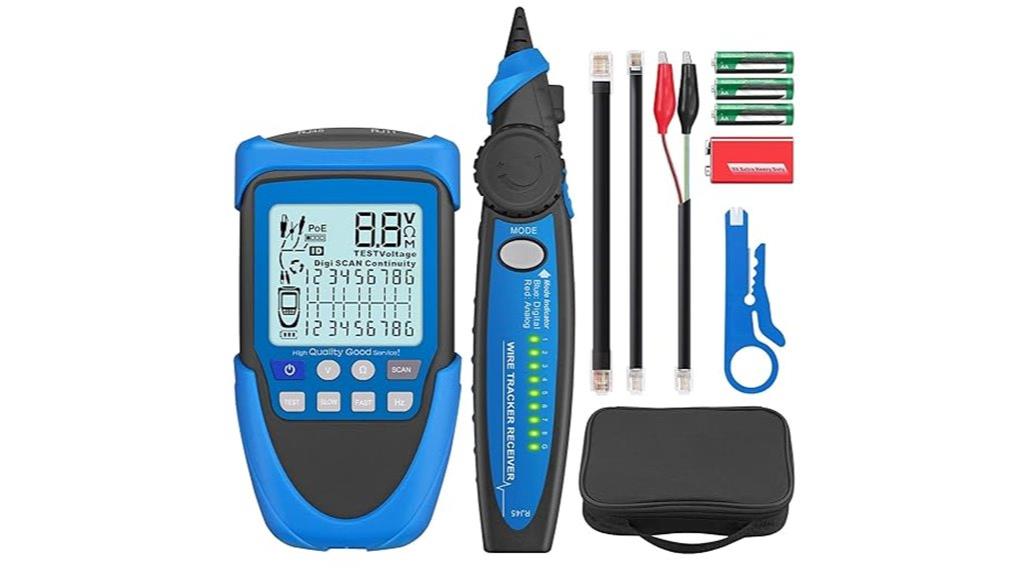
The Network Cable Tester, PoE Cable Tester for CAT5 to CAT8, is an ideal tool for professionals who need to quickly identify and verify network and PoE cables across various standards. It supports testing CAT5, CAT5e, CAT6, CAT7, and CAT8 cables, along with RJ45 and RJ11 terminals. The device features three tracking modes—POE, Digital, and Analog—allowing precise cable tracing and identification. It can test PoE voltage, polarity, mode, and PSE type, ensuring safe and reliable power delivery. The LCD screen and adjustable sound enhance usability, making it a versatile device for troubleshooting, setup, and maintenance tasks.
Best For: IT professionals, network technicians, and maintenance personnel who need a comprehensive tool for testing, tracing, and verifying network and PoE cables across multiple standards.
Pros:
- Supports a wide range of cable types including CAT5 to CAT8 and RJ45/RJ11 terminals, ensuring versatile use.
- Features three tracking modes (POE, Digital, Analog) for precise cable identification and troubleshooting.
- Equipped with an LCD display, adjustable sound, and flashlight for enhanced usability in various working environments.
Cons:
- May require some familiarity with network testing procedures for optimal use.
- The device’s multiple functions could be overwhelming for casual or infrequent users.
- Limited information on battery life and long-term durability in the provided overview.
Fluke Networks MS-POE MicroScanner Ethernet Cable Verifier and PoE Tester
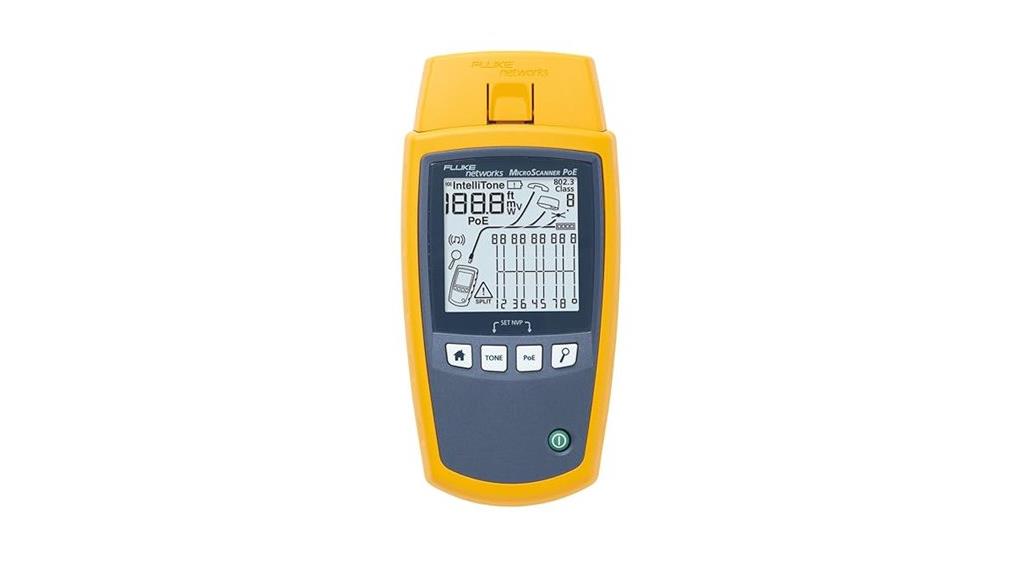
For professionals who need a reliable tool to verify PoE installation and troubleshoot network issues quickly, the Fluke Networks MS-POE MicroScanner Ethernet Cable Verifier and PoE Tester is an ideal choice. It supports Class 0-8 PoE standards, detects power from PSE devices, and measures voltage up to 90 Watts, making it easy to verify active PoE sources. Its network testing features include cable length measurement, wire mapping, fault detection, and support for switch speeds up to 10G Ethernet. The device’s bright backlit LCD and rugged design guarantee clear results in any environment, streamlining installation and diagnostics for reliable network performance.
Best For: professionals responsible for installing, verifying, and troubleshooting PoE-enabled networks and devices in active environments.
Pros:
- Supports a wide range of PoE standards (Class 0-8, 802.3at, af, bt, UPOE, PoH) for versatile testing.
- Combines PoE verification with comprehensive network and cable testing features, including cable length, wire map, and fault detection.
- Rugged, ergonomic design with a bright backlit LCD ensures reliable use in various conditions.
Cons:
- Probe for cable toning sold separately, adding extra cost if needed.
- Limited to testing cables up to 460 meters (or 1500 feet) with 0.3-meter resolution, which may not suit very long cable runs.
- Requires batteries (AA), which may need replacement over time; no rechargeable option included.
Jonard Tools POE-1 PoE & Cable Testing Tool
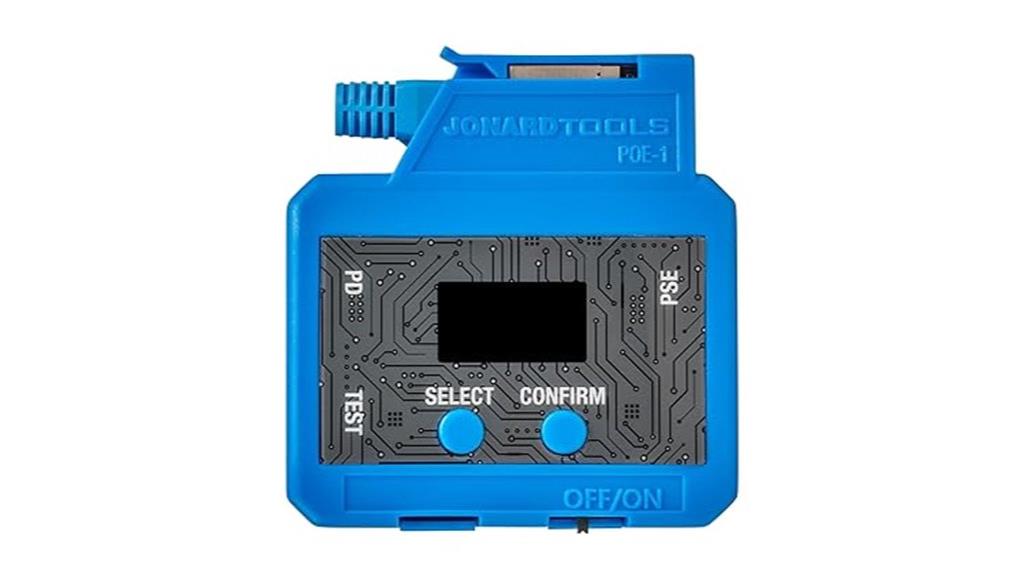
Engineered for network technicians, the Jonard Tools POE-1 PoE & Cable Testing Tool stands out as a versatile device supporting multiple PoE standards, including Passive, 802.3af, 802.3at, and 802.3bt. It quickly detects PoE signals, measures voltage and amperage, and verifies cable continuity across Cat5, Cat5e, Cat6, and Cat6a cables. Its durable design suits tough environments, and it operates without batteries when powered by PoE. The package includes a remote, adapters, and instructions, making it ideal for on-the-spot testing of powered or unpowered cables. Overall, it’s a reliable, easy-to-use tool that guarantees your network’s power and data integrity.
Best For: network technicians and IT professionals seeking a reliable, multi-functional tool for testing PoE signals and verifying Ethernet cable continuity in various environments.
Pros:
- Supports multiple PoE standards (Passive, 802.3af, 802.3at, 802.3bt) for versatile testing
- Measures voltage, amperage, and resistance to ensure proper power delivery and data transmission
- Durable construction with portable design, including belt clip and remote for on-the-go use
Cons:
- Some units may arrive with dead batteries or missing components, indicating inconsistent quality control
- Limited fault detection that may not identify all cable issues or provide detailed diagnostics
- Higher price point compared to simpler testers, which may be a consideration for budget-conscious users
VCELINK Network Cable Tester with PoE Finder

If you’re looking for a reliable tool to verify PoE power sources quickly and accurately, the VCELINK Network Cable Tester with PoE Finder is an excellent choice. Its compact design and high-sensitivity chips allow for precise detection of PoE sources, distinguishing between endspan and midspan injectors. The device features dual bright LEDs for easy reading and a testing cable for tight spaces, making installation safer and more efficient. It’s perfect for on-site testing before cable installation, helping guarantee safe power delivery to cameras, Wi-Fi access points, and IP phones. With its extensive features, it simplifies network setup and reduces troubleshooting time.
Best For: professional network installers and engineers seeking a portable, accurate tool for quick PoE source verification and cable testing on-site.
Pros:
- Compact and pocket-sized for easy portability and use in tight spaces
- High-sensitivity chips enable precise detection of PoE sources, distinguishing between endspan and midspan injectors
- Dual bright LEDs provide clear, quick readings for efficient testing
Cons:
- Limited to RJ45 and RJ11 cable testing, without advanced network diagnostics
- Testing cable length and continuity functions are not specified, potentially limiting comprehensive troubleshooting
- May require manual interpretation of LED indicators, which could be less intuitive for beginners
Network Cable Tester, Poe & Ethernet Network Tester with NCV & TDR
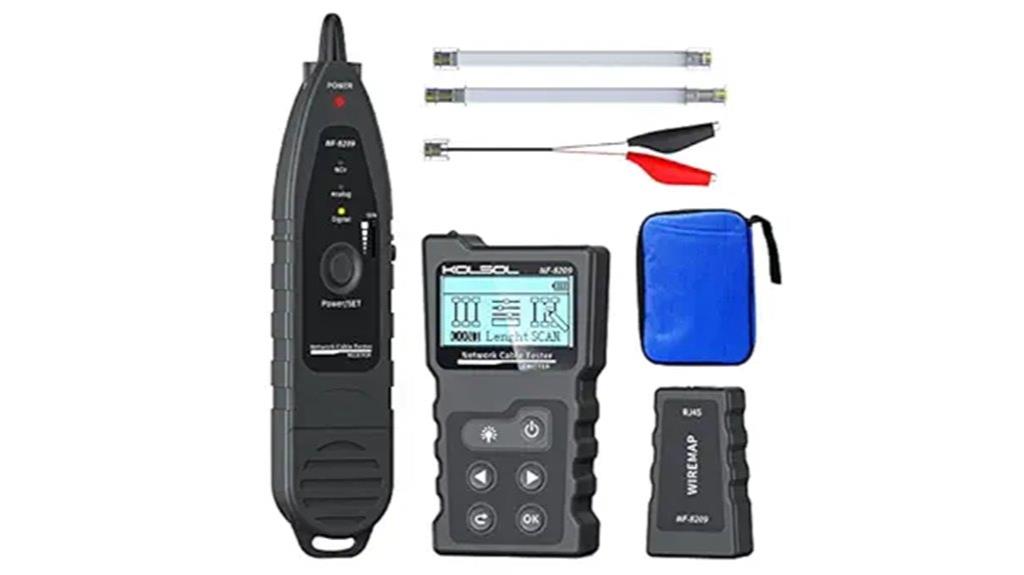
The Network Cable Tester, PoE & Ethernet Network Tester with NCV & TDR is an all-inclusive tool for network technicians who need precise diagnostics and versatile testing capabilities. It supports CAT5e, CAT6, and CAT6a cables, functioning as a cable tracker, fault locator, and length measurement device. With NCV detection, it identifies voltage presence, while TDR-based testing offers accurate cable length readings up to 200 meters. Its three scan modes—AC filter, analog, and PoE—allow testing of PoE device info, power supply, and polarity. Additionally, it locates network ports via flashing switch lights and detects AC voltage, making it a thorough tool for troubleshooting and installation.
Best For: network technicians and IT professionals seeking a comprehensive cable testing tool for installation, troubleshooting, and maintenance of LAN networks.
Pros:
- Supports multiple cable types (CAT5e, CAT6, CAT6a) for versatile applications
- Includes NCV detection and TDR-based length measurement for accurate diagnostics
- Locates network ports and detects voltage issues, simplifying troubleshooting
Cons:
- May require familiarity with different testing modes for optimal use
- Limited to testing up to 200 meters in cable length, which may not suit very large installations
- Some users might find the device’s multiple features overwhelming without proper training
Factors to Consider When Choosing a Poe Voltage Tester Device
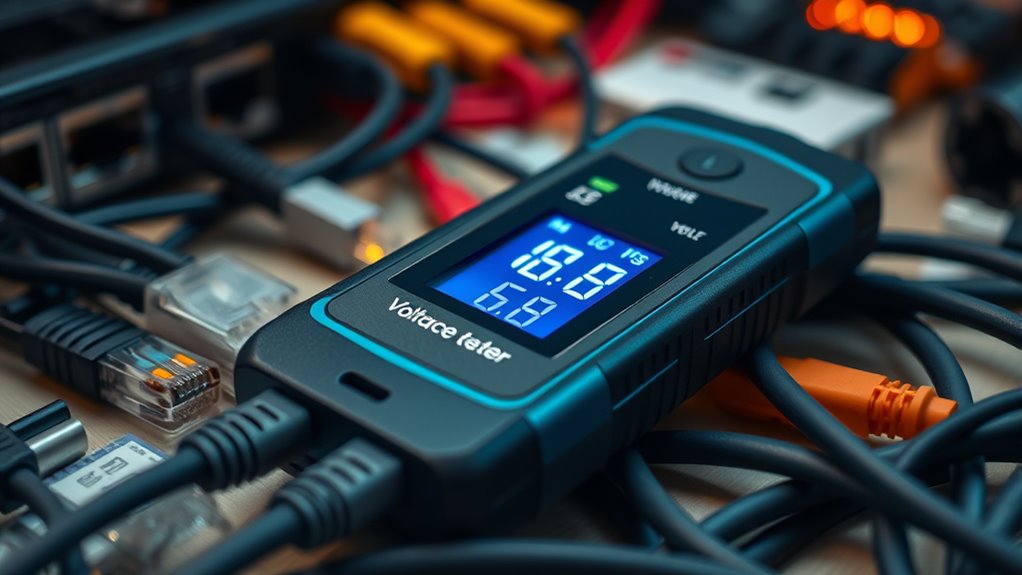
When selecting a PoE voltage tester, I look at how well it matches industry standards to guarantee reliable results. Accuracy in measurements, ease of use, and detection range are also critical factors to me, as they affect how confidently I can work. Finally, I consider build durability to make sure the device withstands regular use in various environments.
Compatibility With Standards
Choosing a PoE voltage tester that supports multiple standards is crucial to guarantee compatibility with a wide range of devices. Make sure it covers IEEE 802.3af, 802.3at, and 802.3bt, which are the most common PoE standards. This guarantees it can verify both low-power and high-power devices. Additionally, check if the tester can detect passive PoE voltages, typically between 11V and 60V, depending on the system. Confirm it can identify polarity modes, Mode A and Mode B, to prevent incorrect connections that could damage equipment. The voltage measurement range should cover up to 60V or higher to accommodate various PoE outputs. In the end, a good tester differentiates standard from non-standard PoE setups, ensuring safe, compatible operation across different network configurations.
Measurement Accuracy
Accurate PoE voltage testers are vital for reliable network diagnostics, as they provide readings within a small margin of error—usually ±1V or less. This precision guarantees I can trust the voltage levels I measure, preventing potential damage to equipment or faulty troubleshooting. High-quality testers can detect voltages from as low as 3.5V up to 60V or more, covering all PoE standards. They also distinguish between standard (36-57V) and non-standard (12-57V) PoE with minimal deviation, which is essential for proper identification. Consistent measurement results help me avoid false readings that could lead to unnecessary repairs or overlooked issues. Devices with advanced sensors and calibration features maintain accuracy over time, giving me confidence during every diagnosis.
Ease of Use
A user-friendly PoE voltage tester should feature a clear and intuitive interface, such as LED indicators or a simple digital display, so I can quickly understand the voltage status at a glance. Minimal setup is vital; I prefer devices that work straight out of the box with plug-and-play operation, saving time and reducing frustration. Straightforward controls, like a single button or automatic detection modes, help me avoid errors and guarantee accurate readings. Portability and ergonomic design are also important, especially when working in tight or awkward spaces—compact, lightweight models make handling easier. Additionally, clear labeling of lights or display information allows me to interpret voltage levels and polarity accurately, even in low-light or challenging environments. Ease of use guarantees efficiency and confidence during testing.
Detection Range
The detection range of a PoE voltage tester is a key factor because it determines which voltages I can reliably identify on Ethernet cables. A wider range, typically from about 3.5V to 60V, ensures I can detect both standard PoE (around 15V to 57V) and passive or non-standard voltages. This flexibility is crucial for accurate diagnosis across different devices and setups. If a tester’s detection range is too narrow, it might miss certain PoE signals, especially in complex or mixed environments, leading to false negatives or misdiagnosis. Devices with a broad detection range give me confidence that I won’t overlook power sources or types of PoE, making troubleshooting more precise and efficient. Choosing a tester with the right detection range is essential for reliable network power checks.
Build Durability
When selecting a PoE voltage tester, prioritizing build durability is vital because it guarantees the device can withstand the rigors of daily use in various environments. A rugged, impact-resistant casing is essential to handle drops and rough handling. Water and dust resistance ratings like IP65 ensure the tester performs reliably outdoors or in industrial settings. High-quality construction, reinforced joints, and corrosion-resistant contacts extend its lifespan, especially in harsh conditions. Rubberized grips or anti-slip surfaces improve handling and reduce accidental drops during use. Additionally, features like reinforced probes and secure battery compartments help prevent damage from physical stress. Choosing a durable device means you’ll have a reliable tool that endures challenging environments, ensuring consistent performance and long-term value.
Power Source Options
Choosing the right power source for a PoE voltage tester directly impacts its usability and convenience. Many models draw power directly from the Ethernet cable or PoE source, eliminating the need for batteries or external power supplies. This setup allows for continuous operation, especially if the tester supports passive PoE and standard PoE (IEEE 802.3af/at/bt), with voltage detection ranges typically between 3.5V and 60V. Some testers are self-powered through the PoE line, which means you don’t need to carry extra batteries. Accuracy varies among devices, with professional-grade testers offering precise readings within a small margin of error. Compatibility with different PoE standards ensures the device can handle both low and high-voltage configurations safely, enhancing reliability during testing.
Size and Portability
Size and portability are essential factors because a compact, lightweight PoE voltage tester is easier to carry, especially during fieldwork or troubleshooting. Smaller testers fit comfortably in a pocket or tool bag, making quick access simple when needed. Their lightweight design reduces user fatigue and allows for one-handed operation, which is vital in tight or awkward spaces. Compact size improves maneuverability in confined environments like wall jacks, ceiling panels, or behind equipment racks. Many portable testers include features such as lanyards or clips, making it easy to attach them to your belt or bag for hands-free carrying. However, smaller, lightweight devices might be more vulnerable to damage if not built with sturdy materials, so durability should also be considered alongside size.
Indicator Clarity
Clear indicator lights are essential because they provide immediate, unmistakable information about PoE status. I look for devices with distinct, universally recognized colors like green, blue, and red to avoid confusion. High contrast and brightness levels ensure visibility in any lighting, even dark environments. A good tester should offer unambiguous LED signals or icons that clearly explain the specific PoE type, voltage level, or polarity detected. An intuitive indicator system reduces errors by clearly differentiating between standard PoE, passive PoE, reversed polarity, and faults. Reliable indicator clarity minimizes misinterpretation, allowing technicians like me to quickly assess PoE conditions without needing additional tools or reference guides. Clear, precise signals make troubleshooting more efficient and reduce the risk of mistakes during network maintenance.
Frequently Asked Questions
How Does Poe Voltage Testing Differ Between Various Ethernet Standards?
PoE voltage testing varies across Ethernet standards like 802.3af, 802.3at, and 802.3bt because each delivers different power levels. I check for voltage and current differences to make certain of proper power delivery without damage. For example, higher standards like 802.3bt require testing for increased voltage and current capacity. This helps me confirm the device’s compatibility and performance, ensuring reliable network power and preventing potential issues.
Can These Testers Identify Faulty or Damaged Poe Cables Automatically?
Yes, many PoE voltage testers can automatically identify faulty or damaged cables. I’ve found that advanced testers often include features like cable continuity checks, short circuit detection, and power integrity tests, which help pinpoint issues quickly. These tools save me time by providing clear, automated results, allowing me to focus on fixing problems rather than manually troubleshooting. It’s a real game-changer for maintaining reliable network power.
Are Handheld Poe Testers Suitable for Professional Network Installations?
Handheld PoE testers are definitely suitable for professional network installations. I find they’re portable, easy to use, and provide quick, reliable readings on network power and cable integrity. These devices help me verify proper voltage levels, detect faults, and guarantee everything’s functioning correctly before deployment. For any network professional, a good handheld tester is an essential tool, making installations more efficient and reducing troubleshooting time markedly.
What Is the Typical Battery Life of Portable Poe Voltage Testers?
Battery life boils down to balance and bandwidth. Typically, portable PoE voltage testers last between 8 to 12 hours on a single charge, depending on the device’s design and usage. I find that regular testing, especially during prolonged projects, can drain batteries faster. So, I always keep a spare or charger handy. Staying savvy about battery life helps me stay connected and confident in my network checks.
Do Testers Provide Real-Time Voltage Readings During Active Network Operation?
Yes, many testers provide real-time voltage readings during active network operation. I’ve used several that display live data, allowing me to monitor voltage levels instantly without interrupting the network. This feature helps me quickly identify issues or confirm proper power delivery. Just keep in mind, some models might require specific settings or connections to enable real-time measurement, so I always double-check the device’s capabilities beforehand.
Conclusion
Choosing the right PoE voltage tester is vital for reliable network setups. Did you know that 70% of network failures are due to poor cable connections or faulty power supplies? By selecting a quality device from this list, you can save time and avoid costly troubleshooting. Investing in the right tester guarantees your network stays efficient and secure, giving you peace of mind with every connection.









